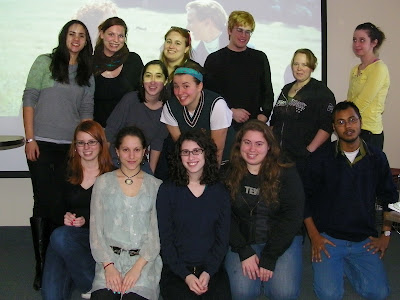Faust and the Faustian are at the heart of Clark's motto, "Challenge Convention, Change the World." We're interested in how this fifteenth-century, small-town German necromancy caught the attention of so many writers, artists, and musicians, including Marlowe, Goethe, Bulgakov, Mann, Havel, Liszt and Gounod.
Monday, December 20, 2010
"Goethe's Faust" in English
Saturday, December 18, 2010
In German: Pact with the Devil vs. the Faustian
For the first time in my life, I realized that the term "Faustian bargain" is not really idiomatic in German. In German, they talk about the "pact," or the "wager," not the "bargain." So I did a search on google books for the phrases "Pakt mit dem Teufel" [pact with the devil] and "das Faustische" [the Faustian]. Note the spike after the Second World War.
Friday, December 17, 2010
In English: "Faustian Bargain"
Tuesday, December 14, 2010
Urich Grothus: Sixty Years of Thomas Mann's Doctor Faustus
Sixty Years of Thomas Mann's Doctor Faustus
Urich Grothus
2008
A fan of Goethe's Faust and the Faust myth in general, Urich Grothus makes a few points about the literature. Firstly, he sees Syphilis as more of a metaphor for a pact with the Devil, which enables Leverkuhn to begin on his musical journey-- "The infection is interpreted as a stimulant to artistic creativity - and as a silent pact with the devil who makes his appearance exactly half-way through the novel, probably only in Leverkühn’s fantasy." He describes the untreated syphilis as Leverkuhn's undoing in the end, paralyzing him the day he invites his friends over to share his presentation of his "Lament of Doctor Faustus" and to inform them of his condition.
Grothus describes the novel as a parallel for the "entire era from Imperial Germany to the Nazi regime." He describes Zeitblom as definitively non-Nazi, but not necessarily anti-Nazi, as he never actually resists them. Through Zeitblom, Mann articulates his idea that the “good” in German society and intellectual history could not easily be separated from the “bad” and dark.
Grothus goes on to compare Leverkuhn to both Nietzsche and Schoenberg, arguing that the latter is clearly the model for Leverkuhn's musical life, citing the 12-tone music as Schoenberg's invention, and the former for Leverkuhn's "clinical history." He offers a little insight to the relationship between Mann and Schoenberg: "Schönberg, whose sense of humor was not quite up to his musical genius, was furious to be portrayed as suffering from syphilis and being in a pact with the devil (and even feared that future generations might think Mann, rather than he, had invented the system). Schönberg had once said that his system would “ensure the hegemony of German music for the next hundred years”. Even he was not free from the temptation to style Germany as the unique music nation, different from and superior to any other."
Grothus thus describes the desire for Germany to be unique and great-- the Kulturnation-- as the first central topic of the novel; the closeness "of aestheticism and barbarism, of beauty and crime, ...which touches the fundamental role of art in society" as the second topic of the novel; and music-- with Theador Adorno as Mann's musical advisor-- as the third topic.
Comparing modern Germany to the Germany of Mann's time, Grothus says, "the strain of irrationalism that Mann describes and that was so fraught with disaster has all but vanished in contemporary German culture." He discusses the moving away from philosophy as a topic of fascination for the German people-- how few modern graduates have even given the consideration that previous generations have to philosophical works, but philosophy's neighbor, music, has survived.
He concludes saying, "there are good reasons to believe that, finally, democracy in Germany has been the success that Thomas Mann, in Zeitblom’s words, had already hoped for during the Weimar Republic. “It was an attempt, a not utterly and entirely hopeless attempt (the second since the failure of Bismarck and his unification performance) to normalize Germany in the sense of Europeanizing or “democratizing’ it, of making it part of the social life of peoples.”
Thursday, December 9, 2010
Faust Entering Other Literature:
Thursday, December 2, 2010
Václav Havel’s Faust Drama Temptation (1985): Or, The Challenge of Influence
http://muse.jhu.edu/journals/goethe_yearbook/v007/7.bahr.html
Here are my notes:
Václav Havel’s Faust Drama Temptation (1985): Or, The Challenge of Influence
By Ehrhard Bahr
Goethe Yearbook: Publications of the Goethe Society of North America (GSNA) 1994; 7: 194-206.
Bahr began the article by discussing that while the Faust story has been retold countless times, no one has exclusive rights to it (not even Goethe!). Yet, it’s important to note that the Czechs believe the Faust legend remains part of their national heritage since one of the earliest translations was a Czech translation in 1611. The 1985 version was written by Vaclav Havel, a master of absurdist theatre (Their work expressed the belief that, in a godless universe, human existence has no meaning or purpose and therefore all communication breaks down. Logical construction and argument gives way to irrational and illogical speech and to its ultimate conclusion, silence; characters caught in hopeless situations forced to do repetitive or meaningless actions; inadequacy of language to form human connections; nonsense), and a prominent dissident of the “Velvet Revolution” (non-violent revolution in Czechoslovakia that saw the overthrow of the communist government). He was also a principle organizer of the Czechoslovak human rights organization Charter 77, until he was jailed repeatedly for a total of 5 years. Interestingly, Havel was presented with versions of Faust by Goethe and Mann while in prison, instead of the traditional socialist realism readings, but I’ll talk about the reason for that later. He wrote Temptation after returning home from prison, which turned out to be one of the darkest periods of his life. Being so, he interpreted the Faust story differently, as he attempted to confront the intellectual and ethical problems of his time. His central theme was: “responsibility and the affirmation of individual identity in a time of dehumanizing pressures exerted by the totalitarian state and/or modern society,” which ran parallel to his real life beliefs. Havel expresses that repression and regulation of ideas are the real moral enemies of humanity, and that a “devil” who encourages independent pondering of the deep questions is working for good, not evil. This idea connects to his firm support for dissidents as agents that rebel against a repressive power, which characterized the majority of his political career before he became President of the Czech and Slovak Republic in 1990.
Bahr went into depth on how Havel’s version of Faust was influenced by Goethe and Mann’s versions.
Examples: protagonist’s first name is Henry (Henreich like Goethe’s) instead of the traditional John (Johann); existence of a Margarete figure, named Marketa, who suffers nearly the same fate as her Goethean counterpart; Mann’s motif of a “cutting coldness” radiating from the devil character; appearance and behavior of devil; costume party with Goethean Walpurgis Night theme (everyone dressed accordingly)
Havel goes farther than Mann when his protagonist outdoes the devil in coldness. If you look at scene 9 (p. 61), when Foustka gives in to temptation and thinks he’s manipulated Fistula, the devilish figure’s teeth begin to chatter and he rubs his arms, exclaiming “Man, you must be 100 below zero!”
Bahr then describes the instance where Havel was imprisoned by the secret police of Czechoslovakia, and had a trap set for him. They provided him with Goethe’s and Mann’s versions of Faust in order to distort his statements and ruin his credibility with other dissidents. After reading them, he began to have “strange dreams and ideas” and felt that he was being physically tempted by the devil. He later described this incidence as his greatest moral failure.
Read quote from reading pg. 196
From this experience, Bahr describes Havel’s idea, originally from Martin Heidegger’s existential, of “two souls in one breast.” It became a central idea in Temptation, that it’s immoral to try to shift the blame onto someone else. In other words, “The individual cannot blame other persons or circumstances or shift responsibility onto that “other soul” in his breast. Such an attempt would lead, according to Havel, to the disintegration of one’s own identity.”
Bahr drew his thesis out of this idea. Using the term tessera, which means “completion and antithesis,” he argues that Havel “rewrote the central theme of Goethe’s Faust, namely, the problem of two souls in one breast, because he thought that Goethe had failed to resolve the problem with enough ethical rigor to meet the demands of our times.” Havel had a strong desire to challenge the ethics of the interpretations from the older texts.
In order to prove his argument, he went through the scenes and characters, drawing comparisons and showing how Havel expanded the Faustian myths of Goethe and Mann to accomodate the current state of affairs in Central Europe in the 1980s.
Examples: Dr. Foustka seduces Marketa intellectually, as opposed to Goethe’s Faust’s sexual seduction. In the 20th century, intellectual seduction is far more powerful; Marketa sent to psych ward which was the customary procedure for handling dissidents in the former Soviet Union…there, Marketa attempts suicide while singing the same song that Goethe borrowed from Ophelia’s Hamlet scene…Foustka lies to save his own skin, not coming to her rescue in the end.
It’s important to note that in Havel’s version, Foustka was not saved by a divine grace in the end. Instead, he was shown ridicule, and his dissidence was trivialized, as shown when everyone began clapping after his impassioned speech on the last page. He was not allowed to get away with his corrupt behaviors of manipulation. As he was not shown as a positive figure, Havel used Foustka’s negative aspect to address his own personal moral failure, and to allow the audience to realize within themselves what is good. Since Havel lived througha tumultuous political era, this interpretation of the Faust story was necessary as a model for dealing with the totalitarian past of Central Europe. He essentially provided an ethics for dissidents in the post-totalitarian states of Eastern Europe.
Vaclav Havel's Temptation
I love coincidences. Both Tom Stoppard and Vaclav Havel are both from the former Czechoslovakia. More importantly, Vaclav Havel was the last president of Czechoslovakia and the first president of the Czech Republic.
I am enjoying the social/political satire of Soviet Europe in Temptation because I am so intrigued by dissent movements. The Scientific Institute certainly clamps down on what Foustka and dissidents in society have to say. In addition, there's the whole creepy Fistula spy thing going on and the end scene of everyone except Foustka assimilating and dancing in tune to the music.
Wednesday, December 1, 2010
Havel's Temptation
Here are some photos of the show.
And here's another link.
Monday, November 29, 2010
Liszt: Faust Symphony and Dante Symphony
Allow me to share with you a symphony by one of my favorite pianists/ composers- Franz Liszt
Now, not a person remotely talented musically, or educated beyond a few years of flute, I consider myself still able to appreciate a good tune.
The Faust and Dante Symphonies, ladies and gentlemen, by Franz Liszt:
(I like the fact that geeks and composers have helped us reach a point where we can embed entire playlists as flash frames. Just keep clicking next above to listen to the full thing.)
Sunday, November 28, 2010
Dante and Goethe

I have started (and will most likely finish over Winter Break) Dante’s Inferno, the first part in The Divine Comedy. It is a classic that I have wanted to read for some time, and now I have finally allowed myself to make my nerdy dream come true. After reading the first Canto, and snooping through some of the commentary provided by the editor, I realized how Faustian this book is.
Evidence in Canto 1:
First line Dante is traveling through the “Midway on our life.” Like Faust, he is Middle-Aged and restless.
Dante cannot handle his restlessness, thus, he “found” himself “now searching” in line 4. Also like Faust Dante has a strong thirst for knowledge, something new.
Further on in the Dante finds a savage Beast. The feline beast is Unfaustien because it “blocks progress”. I interpret the Beast represent the lethal politics of the Catholic Church. Dante was exiled from Florence in 1302 due to his political beliefs that the church found unsavory. This large feline is chasing him, and Dante fears for his life, but he is rescued by the poet Virgil. When Dante meets Virgil, he is Star struck. It would be as if I meet Margaret Cho, or Professor Tobin met the Ghost of Herr Goethe. Dante meets his literary inspiration, his hero. Or, as he puts it “the light and glory of all poets” in line 82.
In the next line, 83, Dante talks about his “ceaseless care” in his study of Virgil’s poetry. The element of Care allowed him to study Virgil’s poetry, to open Dante’s eyes. In the story of Faust, on the other hand, Care blinds the protagonist. Another interesting difference in this story is that Virgil is sentenced to live on the outskirts of hell, where as Mephisto works in hell. The guide in Dante’s story is captive, where as the guide in Faust’s story is a collaborator.
Another interesting similarity (outside literature and present in the author’s realities) was the fact that there were both politicians. (Goethe in real life and Dante in real life).
Sunday, November 21, 2010
Exorcising the Devil from Thomas Mann's "Doktor Faustus"
Last week I talked about Karin Crawford's article Exorcising the Devil from Thomas Mann's "Doktor Faustus"
A write up on my presentation can be found here.
A link to the article on JSTOR can be found here.
During class time, we had a guest lecture from Professor Korstvedt from the Music Department on dodecaphonic music and we listened to pieces from Schoenberg.
By Thanksgiving we should hand in our creative writing pieces, based on pp. 382-283, the Thomas Mann style characterizations. We should also be beginning our research for our papers!
Have a great Thanksgiving everyone!
Tuesday, November 16, 2010
The Overwhelming World of Faustian News Articles
Here are links to some of the articles, categorized and with a brief description. If nothing else, it’s a good way to keep up with some current events!
Politics/History/Science:
Scientists, officials and others once affiliated with the Nazis were allowed to come to the United States after World War Two and contributed to important scientific developments.
The pros and cons of energy sources
Geoengineering
The Pakistani-American political relationship
Entertainment:
Scary celebrity children taking over the entertainment industry
Chelsea Handler’s new publishing imprint
Sports:
Payment of college athletes
Yankees players’ high salaries
Sunday, November 14, 2010
Dare by Abiola Abrams
This is the book I was talking about in class - the African American Faustian novel :-)
This is the link to Abiloa Abrams' homepage where you can find out more about her and the book and the story behind the story!
Wednesday, November 10, 2010
FiredUp Presentation
Women Characters in Doctor Faustus
Brigitte Prutti
1. The Mother Figures
Elsbeth Leverkuhn: We have a maternal figure not included in the classic story of Faust. In Adrian’s childhood world, music is manifested on a personal level concerning both mother and stable-maid.
While Mother uses her voice with restraint, Hanne is unbound by reservations. The motif of the “stable-warmth” of music returns to his childhood influence.
Adrian’s musical history begins with this system based on simple melody and its repetition.
There is also an episode when Mother Faust is speaking with the music teacher Kretzschmar: she is possessive of her son while he wishes to “fling himself into the arms of music.” -----Here music substitutes maternal love by portraying how Mother Faust is jealous of the musical “bride” that is to replace her.
Mother Schweigestill tells a story that closely resembles Adrian’s own experiences. About a girl who wants to be seduced and is willing to sacrifice her life for the seduction. This parallels to Adrian’s willingness to be enveloped by music and the sacrifices he makes when he achieves his own seduction.
2. The Female “butterfly”
The transparent butterfly of his father’s mystical speculations about nature remain with Adrian through his childhood memories when he calls the prostitute “Esmeralda”.
The inspiring Muse, the “eternal feminine,” becomes an agent of the poisonous “angel,”, the devil. The social inversion makes a prostitute out of a seemingly “heavenly Muse”. By having sex with the diseased woman, Adrian gains the desired breakthrough of creative inspiration, even though this liberation comes at a deadly cost. His sexual desire becomes the sinful pact with the devil. The enhancement of his creativity via his illness requires Adrian to direct his sexual energies into art.
Her existence as a social outsider and her “otherness” are captured by the image of the exotic butterfly. As a destructive force, the woman is simultaneously the instrument of artistic inspiration.
THERE IS ALSO another thought to keep in mind: That Adrian’s attachment to music is pictured as a wedding. Adrian the female, music the male. Only after his encounter with Esmeralda, the natural genders are inverted. Adrian’s longing “demonic conception manifests itself in copulation; only after he is impregnated with the disease does he obtain his full male creative potency in art.
Without her, the conservative revolution in the music of Adrian would not be possible.
THE LITTLE MERMAID> She sacrifices her tail in order to have human legs, but every step she takes is like walking on sharp pins. She sacrifices her life for a human soul. “There are pains that one gladly and proudly take sin the bargain with pleasures so enormous, pains such as one knows from a fairy tale, pains like slashing knives, like those of the little mermaid felt in the beautiful human legs she acquired for a tail.”
3. Women of the World
Frau von Tolna: sympathizes with Adrian and supports her understanding of his work. Her gift to Adrian was a ring inscripted with a “hymn to Apollo, by Callimachus.” Apollo a Greek god can bless with healing and curse with death from his arrows.
When Zeitblom recalls Adrian’s encounter in Graz, he summons “Apollo and the Muses in order to talk about the event. Zeitblom realizes that through Arians encounter with Esmeralda, “that love and poison here once and forever became a frightful unity of experience; the mythological unity embodied in the arrow.” The relationship between Esmeralda and Tolna is their “structural identity”, their personifications of the unity of “poison” and “healing” female love, as it manifested in the double function of the god Apollo.
Tuesday, November 9, 2010
Dante's Passage at the Begining
Monday, November 8, 2010
Doctor Who
Saturday, November 6, 2010
Leverkuhn bumper sticker
http://www.zazzle.com.au/insanity_is_a_small_price_to_pay_for_brilliance_bumper_sticker-128147455910514572
Friday, November 5, 2010
Illustrations by Harry Clarke in Goethe's Faust (1925)
 I love the feel of an old fragile book. More than that I love old type. But most of all, in this context, I like intricate illustrations, rich in metaphor and skilled in their portrayal of the text, that compliment the old feel of page, text and type.
I love the feel of an old fragile book. More than that I love old type. But most of all, in this context, I like intricate illustrations, rich in metaphor and skilled in their portrayal of the text, that compliment the old feel of page, text and type. I stumbled upon (I mean literally, not by way of any memory-hogging toolbar) a copy of the 1925 New York edition of Goethe's Faust printed by Arden Book Company.
What is special about this particular edition, you ask?
Well, this is the edition which contains Harry Clarke's illustrations.
Here are samples that I took screenshots of:
(Click on the images to enlarge.) And please DO see them enlarged!


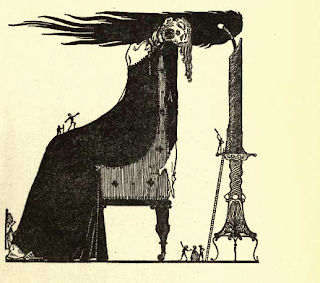
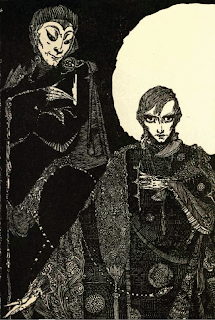



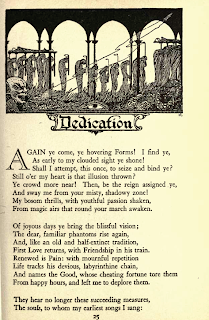
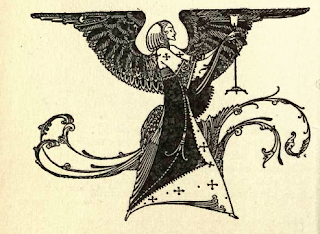

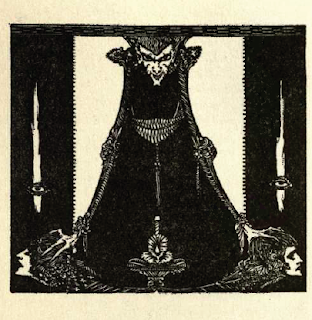

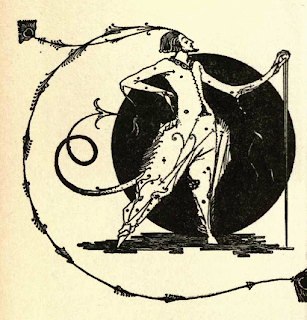
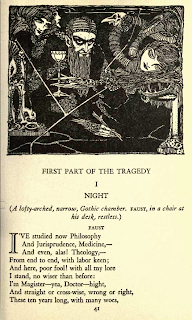
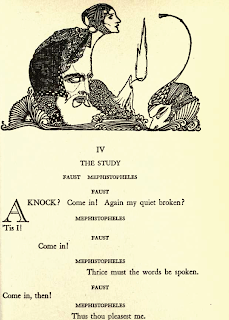
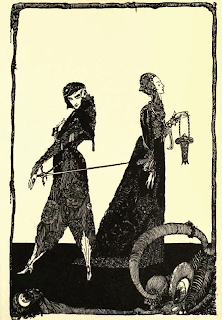
The non-copyright version is available as a PDF file from the Archive.org website. Here is the link where you can download a scanned copy of the book.
Thursday, November 4, 2010
Presentation in Class
I chose the article The Duplicity of the Devil's Pact:Intimations of Redemption in Mann's "Doktor Faustus", by Susan von Rohr Scaff for the presentation.
The Stable URL version can be found on the JSTOR database here.
My writeup on the presentation can be found here. It is a Word document that can be downloaded to your computer.
"We are lost"
"We are lost. Which is to say: The war is lost, and that means more than a lost campaign, it means that we in fact are lost-lost, our cause and soul, our faith and our history. Germany is done for, or will be done for. An unutterable collapse- economic, political, moral, and spiritual- in short, an all-embracing collapse looms ahead. Not that I would have wished for what threatens us, for it is despair, it is madness."
"...liars and frauds then prepared a stupefying poisonous home-brew. That wild intoxication- for constantly yearning to be intoxicated, we drank freely, and under that illusory euphoria we have for years committed a plethora of disgraceful deeds-must not be paid for."
Tuesday, November 2, 2010
A slight briefing on modernism and Mann's Doctor Faustus
For my presentation, my source was Thomas Mann’s Doctor Faustus: A Novel at the Margin of Modernism, edited by Herbert Lehnert and Peter C. Pfeiffer. The book is a collection of essays regarding Thoman Mann’s Doctor Faustus. In the introduction, Herbert Lehnert remarks how Doctor Faustus displays awareness of a change of an era in the 20th century; hence the book’s title regarding modernism.
The book’s notion of modernism revolves around Western society. At the beginning of modernism, religion had a strong influence on morality and social rules. This religious influence was slowly replaced by a secular morality. Modernism features rejection of the certainty of Enlightenment thinking and a revolt against conservative values of realism. Modernism features much ambiguity. Instead of presenting socially-acceptable characters, a modern novel reflects the many faces of a society. A novel playing to modernity does not subscribe to one set of moral codes.
Doctor Faustus deals with modernism as an era, the consciousness of the end of that era, and the transition to the new era of postmodernism. Mann accomplishes this by making Leverkühn be like the original Faust and having allusions to Luther and Nietzche. In the novel, Leverkühn is the modern artist, and Zeitblom is a typical middle class German. Leverkühn represents the creative mind and artistic amorality and immoral use of power. Zeitblom has all of the cultural characteristics of the bourgeois class. By having these two characters symbolize different facets of German society, Mann puts German high culture with creativity against modernist tradition, which is based on reason and guided by religion.
Wednesday, October 27, 2010
German High School Musical: Faust
Basically I Googled the terms 'high school musical' and 'Faust' together, not entirely certain why.
Here is the result:
Part 1:
Part 2:
Part 3:
While I was online...
Thursday, October 21, 2010
Funny Cartoon
Gounod's Faust in Text
Link here!
Wednesday, October 20, 2010
Faust, Der Übermensch, & Leslie Nielsen's Close Encounter
I would say that, although he would appear to have achieved the status of “Übermensch” during his rule of Holland, what truly definitively separates Faust from Nietzsche’s concept of the ideal/authentic human is the fact that Faust never really recognized his ontological potential: unlike the Übermensch proper, Faust sold his soul because he was at no point in his diegetic lifetime forced to confront his existential angst directly and therefore never articulated his transcendental purpose as a human being. Faust was fed up with his worldly status, but instead of trying to realize his place in the realm of existents, he instead repressed his admission of ontological submission to God and sold his soul to Mephisto, the embodiment of negation and non-existence, the representative of the realm of the imaginary.
In this sense, the story of Faust (especially of Goethe’s portrayal) is much like the 1956 science fiction masterpiece Forbidden Planet. For those who have never watched this monument to Classical Hollywood cinema, this film tells the story of a star ship crew (commanded by no other than Leslie Nielsen) and its encounter with a planet that was once inhabited with a race of super intelligent aliens. The planet’s only current residents, a wise old scientist, his flirtatious twenty-something daughter, and Robbie The Robot, reveal the greatest creation and ultimate cause of extinction for the LONG gone former inhabitants. As it so happened, the aliens built a massive, city sized underground machine that could turn pure thought into physical reality. Obviously this didn’t fare well for the aliens, and neither did it for Leslie Nielsen and his men, who suffered the same wrath that the alien civilization had hundreds of thousands of years prior.
Ok, so what does a ‘50s sci-fi blockbuster have to do with classical Faust? Just as Faust’s ambition for omnipotence equated to mass suffering, so to did the extinct alien race of Forbidden Planet amass the power of the imaginary and mythical into reality in a similar vein. Both instances involved successful attempts to harness the powers of that which does not exist and somehow rendered such hyper-realistic power physically with tragic results: Faust did so with the help of the Devil, while the extinct race of Forbidden Planet achieved similar ends with science, knowledge, and technology, the “postmodern Lord” in a sense.
Returning to my initial point, an Übermensch, though ultimately embodying the potential for such power as described above, would never actually suffer the same existential fate as Faust did, or literally fall prey to his/her own abilities par the thematic discourse of Forbidden Planet. I would say, then, that Faust is not an Übermensch: though he flirts with the (metaphorical) rendering of the Übermensch’s boundless abilities, insofar as such ability is only obtainable (much less conceivable) upon authentic ontological articulation before Heaven and nothingness, Faust proves himself unable (or subconsciously unwilling) to recognize his place/purpose as a physical inhabitant of Earth, and therefore succumbs to the transcendental abilities that he cannot actually control.
Left vs. Right in Gounod's Faust
As I was watching Gounod's Faust, I noticed that Mephisto wears his cloak over the right shoulder. I studied Latin for several years during high school and, during that time, we learned that Romans would wear their cloaks (or whatever other drapery they were wearing) over their left shoulders because to them, the right side was the "good" side, and therefore the left side was bad or "evil" and should be covered. (Though it was still developing, this was most certainly furthered by, if not started by, Christianity, which places Christ at the right hand of God, indicating good). In addition, the Latin word for "left" is "sinister"-- sound familiar? This is indeed the root for the modern English equivalent.
Tuesday, October 19, 2010
For the 21+ Crowd
So I got curious about where else we could find Faustian references in non-traditional places, after hearing about the Mephisto shoes last class, and sure enough, this exists:


